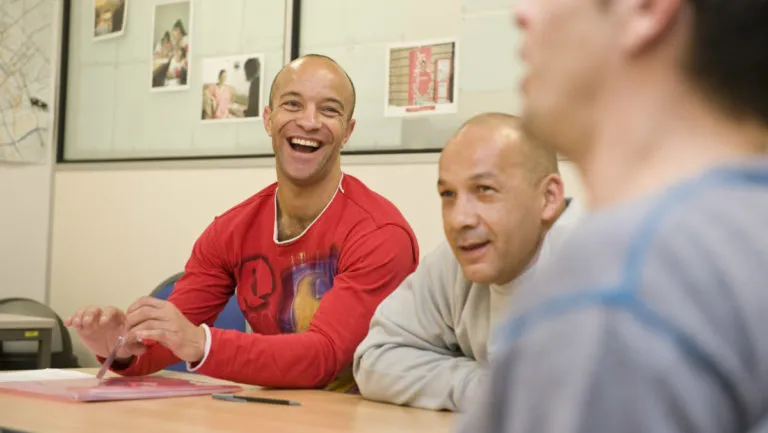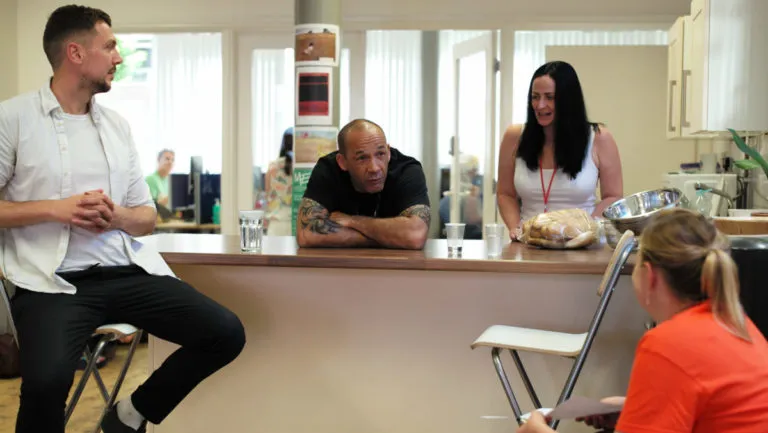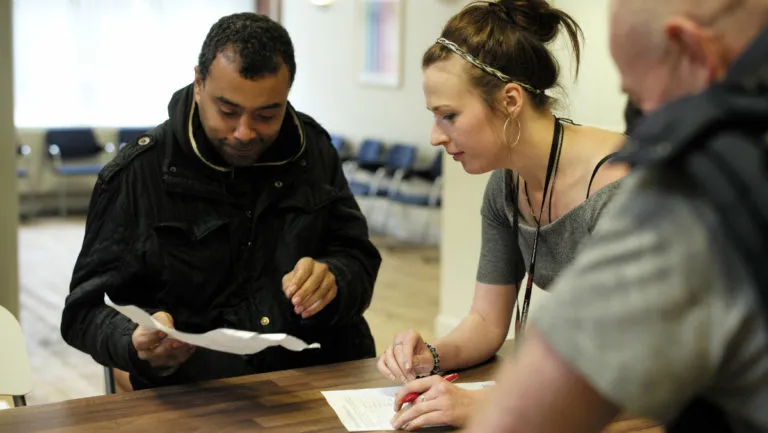Home advantage: why the Housing First model benefits all
Published: by Guest blog

This article is part of a series, ‘Shelter defending the right to a home’, that appears on theguardian.com
Offer a secure home to a homeless person and you’ll slash healthcare, probation and psychiatric nursing bills. The individual will flourish too.
“When you’re on the streets, you don’t sleep properly. You’re always on a heightened state of alert because you don’t know if you’re going to be urinated on, beaten, stabbed … I’ve had teeth knocked out, a piece of my ear bitten off, my ribs broken.”
John had lived on and off the streets of Manchester for 20 years, until Shelter organised a flat for him and his friend David (and David’s dog) a year ago through the Housing First programme. John says it’s been life-changing. “It’s a dream come true. Our tent [where he and David used to sleep] could fit in the dining room. It’s just unreal the difference [having] security makes.”
Being in a secure tenancy has helped John deal with some of the health issues he developed while on the streets, including a leg ulcer, and he has plans to study art at college in the future. David has started driving lessons, which were organised by the team at Shelter.

The housing crisis has reached a critical peak, and the lack of affordability and availability of housing is affecting so many people like John. To ensure that everyone’s right to a home is exercised in response to this mounting crisis, the organisation’s new strategy is seeking to make changes both on a government level, through campaigning, as well as use innovative service models to ensure that everybody is able to find and keep a suitable place to live.
Housing First is one of these models. The concept, originally rolled out in the US and in Finland, where it has almost completely eradicated homelessness, is designed to support those with multiple and complex needs, who might otherwise struggle to maintain a tenancy independently. Shelter’s two-year pilot, delivered through Inspiring Change Manchester (which is funded by the Big Lottery Fund), has had impressive results so far, with 18 of the 21 participants still in accommodation, and the charity is still working with the final three who joined the service slightly later.
There’s also the potential for significant financial gains, thanks to money saved on hospital admissions, further evictions, and costs associated with the criminal justice system. Analysis by the University of York’s Centre for Housing Policy and the Greater Manchester combined authority estimates there would be a 2.65:1 return on investment (pdf), or a £376,893 saving, over five years.
The crucial difference with Housing First, says Shelter development manager Sarah Walters, is people aren’t expected to be tenancy-ready. “Traditional ‘stepped’ models of helping people into their own home would help people get tenancy-ready by reducing behaviour such as drinking or drug taking,” she says. “Housing First takes away all of that. It says here’s your own home, and we’ll put the support in to help you. It’s the application of a very simple idea, that a safe home is a fundamental need and should be a basic right.

“The real work starts when people are in. It’s then the team will work with them to address the behaviour that may have caused them to become homeless in the first place and support them in moving forward with their lives.”
That support will initially include finding a suitable home, helping with furnishings and the move itself, setting up utilities, and registering with local services such as a GP. It’s a relationship that can last for months, or even years, to ensure the tenant stays safe and happy in their accommodation. Caseloads are kept intentionally small – each adviser will only work with up to seven tenants at the same time – and a dedicated peer mentor (who will often have had experience of homelessness or addiction themselves) is assigned to work with clients on a regular basis.
John’s peer mentor is Andy Raftery, who has been working with the Inspiring Change Manchester project since the beginning of the year. Raftery says the support he provides varies, but might include accompanying tenants to weekly doctor’s appointments (as with John) or to see probation officers, helping them open bank accounts, or speaking to utility companies for them. Raftery, who was a heroin user 30 years ago, says his life experience helps him relate to some of the difficulties the clients are going through. “I’ve been in their situation, so I feel like people trust me,” he says. “I know where they’re coming from and I know how difficult it is to have a structured life while trying to control a drug habit or alcohol addiction.”
He has high hopes for John. “He’s safe and is motivated to take care of his own health, which wasn’t happening four or five months ago,” says Raftery. “He’s definitely making progress.”

Although there is still some trepidation about rolling out Housing First in the UK, housing minister James Brokenshire awarded £25m to Housing First pilots in May – in Greater Manchester, Liverpool and the West Midlands – to explore the idea further.
At Shelter, there is frustration about the slow pace of change. “There’s enough evidence out there to show this works,” Walters says. “It’s not the silver bullet that’s going to end homelessness, as it’s not suitable for everyone who’s been on the street, but it’s definitely part of the answer.”
Vanessa Dixon, Shelter’s head of operations for services, agrees. “You’ll actually see costs spike to start with,” she says, because tenants will engage with services and claim the benefits they’re entitled to. “But as we see people stay in that accommodation much longer … those wider costs to society such as reoffending, antisocial behaviour, and [frequent visits to] A&E – they start to decrease.”
The model closely aligns with Shelter’s strategic commitment to defending every person’s right to a home, and it is an area of service delivery that the charity is very keen to grow. The Manchester project has now been extended to women leaving Styal prison and in June, the charity launched a new Housing First project in Dorset for 11 vulnerable people.
For all of its successes, there are also challenges – not least the lack of availability of social housing that means some homes have to be found in the private rental sector. Many landlords are reluctant to take a chance on someone with little (or no) prior tenancy history, who might have visible, complex needs. The rent also has to be covered by the housing allowance the client is entitled to, which further limits the number of suitable properties.
But the impact on the individuals, many of whom will feel stable for the first time in their lives, is beyond doubt. “There are a lot of people who might think it’s bad behaviour rewarded, and it’s not,” says Dixon. ‘It’s actually about investing the time now, to get those people stable, to realise the benefits later on for wider society … [That person] starts to see themselves as part of society and starts to give back in a different way.”